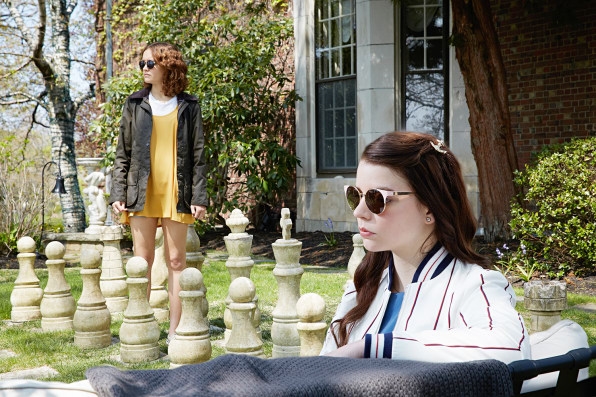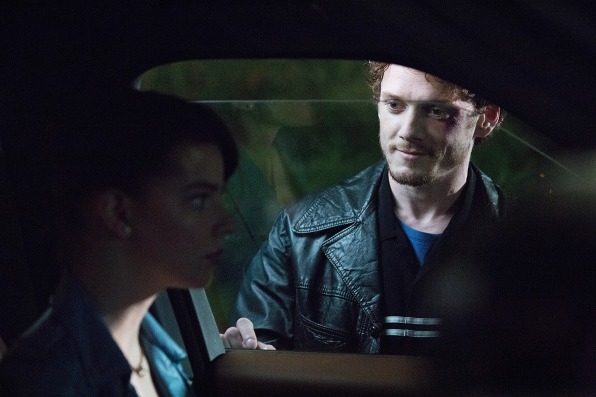How Novice “Thoroughbreds” Director Overcame His Nerves To Make A Savage Little Thriller
When playwright Cory Finley was writing his play Thoroughbred (later changed to Thoroughbreds), he realized that cinematic language like closeups and tracking shots were better suited to what he had in mind for telling the story of two young girls in Connecticut, estranged friends who reunite under a very grim pretense. He also decided that to ensure that the tone was exactly what it needed to be–at the intersection of sleek film noir and pitch-black humor–he would have to direct it himself. What he didn’t realize was just how much first-time director self-doubt would cloud his head.
“Your confidence level will put people at ease if they can feel it, and some of that for me was literally just acting,” Finley says. “The first couple of days I was walking in being, like, I think I know what I’m doing. I’ve never said the word ‘cut’ loudly before, but I think I know how to do this. I had to play the role of the seasoned director and then eventually transition into more grounded control.”
Thoroughbreds is the tale of Lily (Anya Taylor-Joy) and Amanda (Olivia Cooke), two young women whose childhood friendship fell apart after Amanda became a pariah for a violent act she committed. Their forced reunion gives way to something of a real companionship, even though they have diametrically opposite personalities: Lily is the uptight, overthinking perfect one and Amanda is essentially a sociopath. When Lily’s home life reaches a breaking point due to her overbearing stepfather (Paul Sparks), she and Amanda hatch a plan to get him out of the picture permanently.

“Even in playwriting, that elusive word ‘tone,’ that’s always something I’ve really enjoyed and thought about,” Finley says. “What was such a cool discovery about working in film is you have so many more levers by which to manipulate that. You have so much more control over tone. I think it’s a Coen brothers quote where they said, ‘Directing in two words is tone management.’ The process of constructing tone is something you do at every step of the story, and the feel of it was something I would always talk about with everyone from the [director of photography] to the costume designer to the actors.”
For all of Finley’s impeccable attention to detail in crafting this singular world, none of it would matter if he didn’t devote as much energy to creating the characters. Thoroughbreds has been compared to Heathers and American Psycho, with reason, but the movie is really in a lane all its own due to the unique dynamic between the two young women.
“There is a psychological thriller element, but for me, it’s always a dual character portrait first. Before it’s anything else it’s the story of a friendship,” Finley says. “I joked the other day that I actually lifted a lot of things from rom-com structure. It does not have, for example, as many twists and turns in a third act as a typical thriller would have. And that was partly because I just wanted it to be about these two, and the way they relate to one another is more important than what they’re planning at any given moment.”

It would be impossible to talk about character creation and development without mentioning Anton Yelchin, who appears here in his last film project to be released after his death in 2016.
Yelchin plays Tim, the town burnout Lily and Amanda hire to help them to do the dirty work of their plan. The character actually started as a cameo in the play version but turned into the last and very necessary piece in Finley’s tightly spun film.
“To take this character, who on the surface is a creep and sort of a weirdo and has a criminal past–there’s nothing we would like about him. Taking that as an archetype and then making him, hopefully, the most sympathetic character in the movie by the end of it was exciting to me,” Finley says. “Anton . . . saw early on the heart to that character and really brought it out in an amazing way that surprised everyone. It’s a testament to his imagination and his craft.”

T
horoughbreds premiered at Sundance last year to largely positive reviews that highlighted Finley’s skill with both the verbal and the visual to create what the LA Times called “one of the film world’s freshest and nastiest works.” Now, as the movie hits theaters, audiences could come to embrace it as a cult classic–one of those films that captures a mood and generation with a captivating visual style. The assured style is rare for a first-time director. And to think, Finley started out believing he had to fake it until he made it.
“Something I had to overcome quickly was my fear of being selfish and bossy. Part of why it was so fun to write Amanda, who just couldn’t give a fuck what everyone says about her, is that there’s a wish fulfillment for me in that character because I can be a very obliging guy to my detriment,” Finley says. “So I just had to learn that your decisiveness is one of the most important characteristics as a director. It dawned on me that I had to make the final decision on everything and that me being very clear about what I want is not the same as me being selfish or bossy. It actually creates room for other people to have their own creative processes.”
Thoroughbreds is in theaters March 9.
(45)














